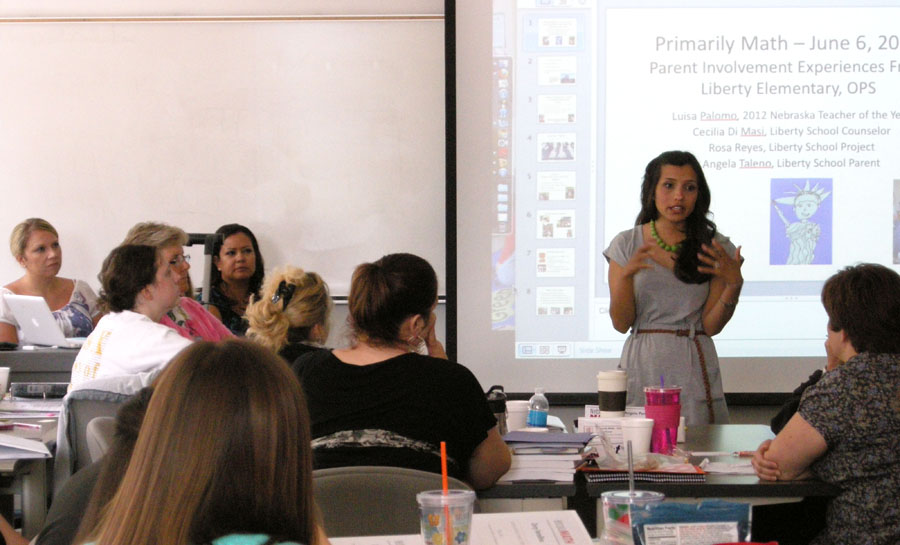
This summer, the Primarily Math teachers in Lincoln Public Schools Cohort 3 had the opportunity to hear from a teacher, counselor, program coordinator and parent from Omaha Public Schools’ Liberty Elementary, a school in a low-income area that has created a full-service community environment that has enriched the lives of its children and their families.
Luisa Palomo, 2012 Nebraska Teacher of the Year and kindergarten teacher at Liberty, brought a team of educators with her to speak to the MATH 802P and TEAC 907 classes taught by Jim Lewis and Ruth Heaton on June 6 about the "Staying in the Green" study skills program. The program was created by school counselor Cecilia Di Masi and is centered on the idea of a stoplight discipline system: red, yellow and green, with green being the goal for each student. Every student brings home a green assignment book each day, and parents are required to sign off on the book each night.
"The stoplight is a universal symbol," Di Masi said. "It doesn’t matter what country the child's parent is from or what language they speak, they all understand the stoplight. I actually have one from a hardware store in my office that is hooked up to electricity so I can turn it to red or green and then point to it. If it's green and I give a thumbs-up, the parent knows their child had a good day."
Primarily Math teachers are required to do two iterations of a family project in mathematics education as part of their course work in Primarily Math. Palomo and her colleagues were invited to speak so that Primarily Math teachers could learn more about their efforts working with families. Primarily Math encourages its teachers to take what they learned and enrich their own plans for working with families in mathematics education in the coming year.
Ninety percent of Liberty's 650 children come from homes living under the poverty line, with the average family of four living on $22,000 per year. Fifty percent of the students are ELL. The goal under these tough circumstances, said Palomo, is to keep the kids in school – the kids know their "job is to come to school."
Liberty has five steps to achieving success for its students:
1. Come to school every day on time.
2. Do all your work.
3. Turn all the work into the "boss" (teacher).
4. Follow Liberty rules.
5. Just do it! (Doing it right the first time is "major green"!)
The green assignment book also is the responsibility of each student. They make sure their parents sign the book, which helps parents stay involved in their child's education. Palomo said 99 percent of the green books are signed by parents. Also, Liberty has only a 10 percent mobility rate now, where it used to be 30 percent, because parents keep their children at Liberty even if they move to another district. Liberty administrators help parents apply for grant funds to help this happen.
"It's about always informing the parents," Palomo said. "The parents' involvement has to meet the needs of the school. We tell the kids that while their teacher is their 'boss,' their parents are the 'big boss.'"
The poverty affecting the school's students has led to educators building a full-service school community. Families lack transportation, food and health care or face issues related to their immigration status. As a result, Liberty provides a School Based Health Center, a clothing pantry, cooking classes, and English classes for parents, just to name a few. The school has formed relationships with doctors and lawyers to get its families the care and help they need so children can still get to school and parents don’t have to worry as much, Palomo said.
Kids are on campus from as early as 6 a.m. to as late as 6 p.m. Therefore, the Completely Kids program, coordinated by Rosa Reyes, funds a before- and after-school program. Most kids participate in Completely Kids, so the school ensures daily lessons are incorporated into the Completely Kids curriculum. Other organizations, such as Building Bright Futures, the Visiting Nurse Association, the YMCA, the Omaha Mayor's Office, and the Omaha Public Library, have a partnership with Liberty in which they provide opportunities to the families that would otherwise not be possible.
"A doctor may turn a family away. A salon may turn you away. But schools don’t turn kids away," Palomo said.
To see a video about this community Liberty Elementary has created, visit the website of the non-profit organization Nebraska Loves Our Public Schools: http://nelovesps.org/watchnow?TN=PROJECT-20120210084445.
To learn more about the stoplight program, Di Masi said she would be happy to visit with teachers or administrators at their school. Email her at: Cecilia.dimasi@ops.org.
More details at: http://nelovesps.org/watchnow?TN=PROJECT-20120210084445